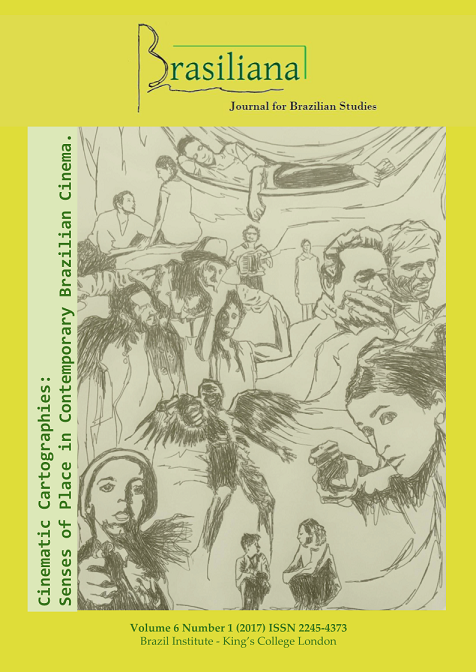Reflecting on hard and soft coups: a comparison of Aquarius by Kleber Mendonça Filho and Land in Anguish by Glauber Rocha
Conteúdo do artigo principal
Resumo
This article aims to study the film Aquarius (2015) by Kleber Mendonça Filho in comparison with Land in Anguish (1967) by Glauber Rocha. The interest in analyzing both films stems from the polemical reception that Aquarius received after its director and cast used the international launch at the Cannes Film Festival in 2016 to protest publically against the impeachment of Brazilian president Dilma Rousseff, denounced by them as a soft coup. Land in Anguish, on the other hand, has long been considered an allegory of Brazil’s political situation after the military coup in 1964. This article will ask if any of the two films can be read as a diagnosis of the country and if how. To do so this study will be guided by the anthropological definition of film developed by German philosopher Martin Seel (2013) who understands the media as the art form that most strongly is capable of moving us, as much emotionally as intellectually, and, in consequence, make us move. I will therefore discuss both Aquarius and Land in Anguish’s potentials to move us and to make us move, asking if they can make us feel and understand Brazil so as to make us act – perchance – within its socio-political structure.
Detalhes do artigo
![]()
Articles published in Brasiliana are licensed under a Creative Commons Attribution-NonCommercial-NoDerivs 3.0 Unported License.
When publishing open access, the author signs an author publishing agreement in which they retain copyright and give Brasiliana the right to publish the article. Our Open Access publications are distributed under the terms of the Creative Commons Attribution 4.0 International License, which permits unrestricted use, distribution, and reproduction in any medium, provided the original work is properly cited.
Referências
Araujo, Inácio. “Sonia Braga espetacular em filme construido meticulosamente.” Folha de São Paulo. www1.folha.uol.com.br, 30 Aug. 2016. Web. 26 Sept. 2016. Balee, Wiliam. “The Brazilian People: The Formation and Meaning of Brazil.” Tipití: Journal of the Society for the Anthropology of Lowland South America, 1.2 (2003): 232-37. Bernadet, Jean-Claude. Cinema brasileiro. Propostas para uma história. São Paulo: Companhia das Letras, 2009. Bernadet, Jean-Claude. Trajetória crítica. São Paulo: Martins Fontes, 2011. Bernadet, Jean-Claude. Brasil em tempo de cinema. Ensaio sobre o cinema brasileiro de 1958 a 1966. São Paulo: Companhia das Letras, 2007 [1967]. Celarent, Barbara. “The Masters and the Slaves by Gilberto Freyre.” American Journal of Sociology, 116.1 (2010): 334-39. Coelho, Marcelo. “Aquarius oferece versão de esquerda para tradição família e propriedade.” Folha de São Paulo. www1.folha.uol.com.br, 18 Sept. 2016. Web. 26 Sept. 2016. Escorel, Eduardo. “Aquarius – o filme em questão. Piaui. www.piaui.folha.uol.com.br, 8 Sept. Web. 26 Sept. 2016. Fireman, Chico. “Arte e política andam juntas em ‘Aquarius’ mas polêmica não se justifica.” UOL. www.cinema.uol.com.br, 29 Aug. 2016. Web. 26 Sept. 2016. Freyre, Gilberto. The Masters and the Slaves. New York: Knopf, 1946 [1933]. Translation. Glioche, Reinaldo. “Intenso e sensorial, ‘Aquarius’ é muito mais do que metáfora política.” Gente. www.gente.ig.com.br, 1 Sept. 2016. Web. 26 Sept. 2016. Johnson, Randal; Stam, Robert. Brazilian Cinema. New York: Columbia University, 1995 [1982]. Holanda, Sergio Buarque. Roots of Brazil. Notre Dame: University of Notre Dame Press, 2012 [1947]. Translation. Menonça Filho, Kleber, director. Aquarius. Vitrine Filmes, 2016. Moraes, Camila. “Censura e protestos aumentam expectative sobre filme ‘Aquarius’.” El País Brasil. www.elpaisbrasil.com, 2 Set. 2016. Web. 26 Set. 2016. Oliveira, Rodrigo Cassio. “Aquarius (Kleber Mendonça Filho, 2016).” www.rodrigocassio.com, 11 Sept. 2016. Web. 26 Sept. 2016 Ormanda, Andrea. “O país do cinismo.” Cinética. www.revistacinetica.com.br, 19 Sep. 2016. Web. 26 Sep. 2016. Prado, Carol. “Aquarius faz reflexão ponderosa mas tem vilão simplista.” O Globo. www.g1.globo.com, 1 Sept. 2016. Web. 26 Sept 2016. Prado Júnior, Caio. The colonial background of modern Brazil. Berkeley: University of California Press, 1967 [1942]. Translation. Rancière, Jacques. “Thinking of Dissensus: Politics and Aesthetics.” In: Reading Rancière, edited by Paulo Bowman and Richard Stamp. London/New York: Continuum, 2011: 1-17. Ribeiro, Darcy. The Brazilian People: The Formation and Meaning of Brazil. Miami: University Press of Florida, 2000 [1993]. Translation. Rocha, Glauber Rocha, director. Terra em Transe/Land in Anguish. Mapa Filmes, 1967. Rocha, Glauber. Revolução do Cinema Novo. São Paulo: CosacNaify, 2005. Romero, Simon. “Brazilian Politics smother a film’s Oscar ambitions.” The New York Times. www.nytimes.com, 28 Sept. 2016. Web. 1 Oct. 2016. Romero, Heitor. “O que o tempo não leva.” Cineplayers. www.cineplayers.com, 5 Sept. 2016. Web. 10 Sept. 2016. Russo, Francisco. “O valor da memória.” www.adorocinema.com. Web. 10 Sept. 2016. Seel, Martin. Die Künste des Kinos. Frankfurt a.M.: S. Fischer, 2013. Xavier, Ismail. Alegorias do subdesenvolvimento. Cinema Novo, Tropicalismo, Cinema Marginal. São Paulo: Editora Brasiliense, 1993.

